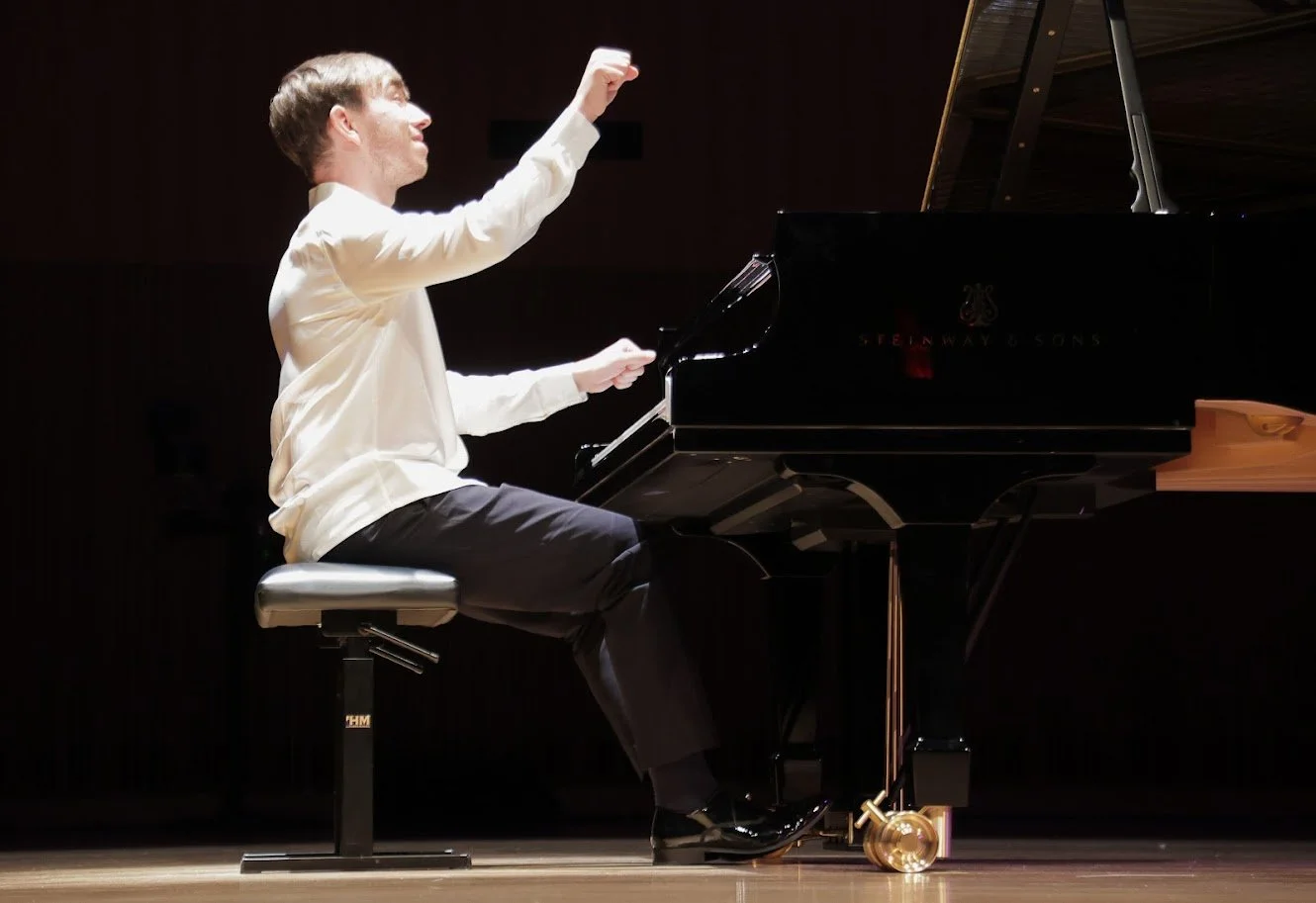Cliburn Competition: Preliminary Recital 5
Photos by Ralph Lauer and Brandon Wade
—Wayne Lee Gay
May 22, 2025: The music of Chopin, once a mainstay at any Cliburn competition, has become something of a rarity in this year's preliminary round; the familiarity of most of his major works may have warned competitors away from this music, though it remains at the core of the piano repertoire. Nonetheless, Russian Mikhail Kambarov, 20, proved that a standard such as Chopin's Ballade No. 3 in A-flat can still serve as an effective competition vehicle for a pianist with insight, imagination, and technique. Kambarov applied the right degree of delicacy with a sturdy emotional approach to bring out the beauty and drama of that particular work. After the required performance of Montero's "Rachtime," Kambarov displayed, in a different direction, an admirably creative approach to programming as he delivered a whispered, subtly pedaled rendition of Scarlatti's Sonata in D minor (K. 213)—before turning immediately to a similarly lightly pedaled, whispered performance of the opening bars of Rachmaninoff's Variations on a Theme of Corelli, also in D minor. He thus miraculously tied together a pair of works otherwise separated by two centuries. Kambarov's performance of the Rachmaninoff Variations steadily rose to fine late romantic era passion, reaching a high point with the transition to D-flat major in the gloriously serene fourteenth variation.
The United Kingdom’s Callum McClachlan, 26 (and the only British pianist in this year's Cliburn), likewise departed from standard formula in his program repertoire. In place of a romantic era blockbuster, he offered the nine modest, short movements of Schumann's Waldszenen ("Forest Scenes"), each with a simple, descriptive title. McClachlan used these short melodic sketches to demonstrate his own skill as a musical colorist—by turns jolly, fluid, solemnly serious (but in an innocent manner), or exuberant—all the while carefully underlining the inherent sophistication of Schumann's compositional style. He followed up with a calmly joyful reading of Montero's "Rachtime," but then took the opportunity to display a more muscular virtuosity in Barber's Sonata, ranging from sparkling brilliance in the second movement to rich weightiness in the third movement—and thunderous power in the fugal finale.
From China, 26-year-old Jairui Cheng launched his opening volley with Bach's Toccata in C minor. One might observe that, while Chopin is almost a rarity, works originally written by Bach for harpsichord have been numerous in this year's Cliburn. Indeed, Cheng's was the third of three different Bach harpsichord toccatas on Thursday alone. Cheng's performance, while not particularly baroque in style, was consistently assertive, lending a sense of unity to the somewhat disjunct structure of the work. His next choice, however, while an effective showcase for his technical skills, was of questionable value, featuring a banal little tune (the famous Danse macabre by Saint-Saëns) dressed up in the pianistic equivalent of gymnastic tricks in a version by Liszt, with added gimmicks inserted by Horowitz. Entertaining, yes, but pretty much void of artistic value (except as an amusing encore). Brahms' Intermezzo in A from Opus 118 provided an antidote of sorts, albeit with a heaviness in Cheng's melody line; Scriabin's Fifth Sonata showed off Cheng's admittedly powerful technical virtuosity in a more interesting form. Cheng closed with the required "Rachtime" by Montero, emphasizing some lyrical aspects of the piece.
Polish pianist Piotr Alexewicz, 25, explored three different aspects of the romantic era in the pieces he chose for his program, beginning with the late Russian romanticism of Nikolai Medtner in the form of that composer's compact but boldly passionate Sonata Elegy in D minor. From there, Alexewicz turned to Brahms' Scherzo in E-flat minor, in a performance emphasizing the youthful energy of the work. After his turn at Montero's "Rachtime," Alexewicz made a strong bid for advancement to the next round with Liszt's "Dante" Sonata, a work demanding powerful muscle, fleet fingers, and angelic delicacy—all of which Alexewicz displayed in this succinct musical description of Hell, Purgatory, and Heaven,



